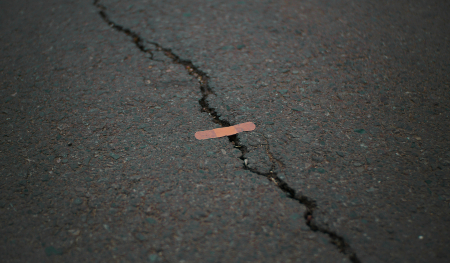We ask you, humbly: don't scroll away.
Hi readers, it seems you use Catholic Online a lot; that's great! It's a little awkward to ask, but we need your help. If you have already donated, we sincerely thank you. We're not salespeople, but we depend on donations averaging $14.76 and fewer than 1% of readers give. If you donate just $5.00, the price of your coffee, Catholic Online School could keep thriving. Thank you.Help Now >
The next pandemic may be here - here's what you need to know about 2019-nCoV
FREE Catholic Classes
Immediately I saw another horse appear, deathly pale, and its rider was called Death, and Hades followed at its heels. They were given authority over a quarter of the earth, to kill by the sword, by famine, by plague and through wild beasts. (Rev 6:8)
Experts warn a new virus spreading across China is also spreading globally and may cause a new global pandemic as deadly as the Spanish Flu pandemic of 1918-1919. That disease caused 50 million deaths globally. The new outbreak could be just as deadly.

The Triumph of Death - Pieter Brugel, c. 1562.
Highlights
Catholic Online (https://www.catholic.org)
1/22/2020 (4 years ago)
Published in Health
Keywords: Novel coronavirus, 2019, pandemic, Wuhan, China, quarantine
LOS ANGELES, CA (California Network) - A new, potential pandemic is developing in Asia, and has already spread to the United States and parts of Asia. Chinese officials recently quarantined a city of nearly 12 million souls to prevent the disease from spreading from its point of origin.
The Centers for Disease Control (CDC) is monitoring the situation and issuing updates as they come available. According to the CDC, the disease in question is "2019-nCoV" a "novel coronavirus." The virus was first detected in the city of Wuhan in central China. The disease has spread rapidly with Chinese experts confirming that it spreads from person-to-person. The Chinese have been applauded for reacting to the outbreak with impressive speed, sequencing the genome of the virus in late 2019.
Coronaviruses are a large family of common viruses, some of which can mutate and become dangerous. They are often found in animals, and some strains can jump from animals to humans.
Officials suspect the outbreak of the disease occurred in a large live-animal meat market where animals are sold alive or slaughtered for human consumption. However, since the initial detection of the virus, new cases have appeared which have no link to the suspected marketplace. This strongly suggests that human-to-human transmission is occurring.
Chinese officials announced on Jan 22 they were quarantining the city of Wuhan. The quarantine is intended to slow or prevent further spread of the disease. Already, at least one case has been detected in the United States.
About 470 cases have been confirmed, nearly all cases in China. Individual cases have been reported in Taiwan, Thailand, Japan, South Korea, and the United States. There are unconfirmed reports of a case in Mexico. At least 17 deaths have been attributed to the disease.
However, experts warn the official statistics often lag behind the actual numbers. Many cases are probably still unreported, and some deaths may have occurred and are being attributed or unreported. The number of infected persons could be in the thousands.
British professor Neil Ferguson was quoted in The Sun, a British Tabloid, that the number of deaths appears to be "roughly the same as for the Spanish flu epidemic." That disease killed 50 million people around the world in just one year. By comparison, four years of warfare (World War I) produced only 35 million casualties.
It is certain that many more deaths are to come and the only question is if officials can halt the spread of the disease before it goes global. Screening centers have been established at airports around the world. Travel to and from China, and possibly much of Asia may be stopped if the disease keeps spreading.
We ask you, humbly: don't scroll away.
Hi readers, it seems you use Catholic Online a lot; that's great! It's a little awkward to ask, but we need your help. If you have already donated, we sincerely thank you. We're not salespeople, but we depend on donations averaging $14.76 and fewer than 1% of readers give. If you donate just $5.00, the price of your coffee, Catholic Online School could keep thriving. Thank you.Help Now >
At present, it appears that older people and people with underlying health conditions are at greatest risk. It is unclear how easily the virus spreads from person-to-person. The virus causes pneumonia in some patients, which is sometimes fatal. Officials are still learning about the disease.
The best advice is to avoid travel, especially to the central region of China where the outbreak is ongoing. If the disease spreads, all people will need to take precautions. Minimizing unnecessary travel and human contact is the first step. Those who are sick should remain home, unless their condition deteriorates and requires medical attention. Face masks and handwashing are critical to preventing infection. Hand sanitizer also helps.
At this time, there is no need for general alarm, but all people should pay attention to updates from official sources in the weeks and months ahead. If the disease does spread, public notices and directives will be issued. It is important that all people follow such recommendations.
Even the worst pandemic diseases eventually "burn" themselves out. But periodically, diseases emerge that have the right combination of contagiousness and virulence. When that happens, as has happened many times in history, millions of people may die. Such diseases tend to emerge in densely populated areas, especially where there is close contact between humans and animals. This is why many new viruses seem to emerge from China. It is a product of population density.
Pandemic diseases have changed the course of history. Notable examples include the Black Death between 1347-1354, and the Colombian Exchange between the Americas and the rest of the world. The Colombian Exchange resulted in the deaths of about 100 million native people as a result of the cocktail of diseases which European settlers carried with them.
---
'Help Give every Student and Teacher FREE resources for a world-class Moral Catholic Education'
Copyright 2021 - Distributed by Catholic Online
Join the Movement
When you sign up below, you don't just join an email list - you're joining an entire movement for Free world class Catholic education.
-

-
Mysteries of the Rosary
-
St. Faustina Kowalska
-
Litany of the Blessed Virgin Mary
-
Saint of the Day for Wednesday, Oct 4th, 2023
-
Popular Saints
-
St. Francis of Assisi
-
Bible
-
Female / Women Saints
-
7 Morning Prayers you need to get your day started with God
-
Litany of the Blessed Virgin Mary
Catholic Bishops Call for Civil Dialogue Amid Church Polarization
-

Pope Francis Emphasizes Charity as the Pinnacle of Christian Love
-

Discovering the Heart of Love: Pope Francis Shares Wisdom on Charity
-
Come Holy Spirit! The Whole Church Needs Pentecost
-
Our Lady of Fatima asks the same thing of us today
Daily Catholic
 Daily Readings for Thursday, May 16, 2024
Daily Readings for Thursday, May 16, 2024 St. Simon Stock: Saint of the Day for Thursday, May 16, 2024
St. Simon Stock: Saint of the Day for Thursday, May 16, 2024 Prayer to St. Gabriel, for Others: Prayer of the Day for Friday, May 10, 2024
Prayer to St. Gabriel, for Others: Prayer of the Day for Friday, May 10, 2024- Daily Readings for Wednesday, May 15, 2024
- St. Dymphna: Saint of the Day for Wednesday, May 15, 2024
- Prayer for Travelers: Prayer of the Day for Thursday, May 09, 2024
![]()
Copyright 2024 Catholic Online. All materials contained on this site, whether written, audible or visual are the exclusive property of Catholic Online and are protected under U.S. and International copyright laws, © Copyright 2024 Catholic Online. Any unauthorized use, without prior written consent of Catholic Online is strictly forbidden and prohibited.
Catholic Online is a Project of Your Catholic Voice Foundation, a Not-for-Profit Corporation. Your Catholic Voice Foundation has been granted a recognition of tax exemption under Section 501(c)(3) of the Internal Revenue Code. Federal Tax Identification Number: 81-0596847. Your gift is tax-deductible as allowed by law.









 Daily Readings for Thursday, May 16, 2024
Daily Readings for Thursday, May 16, 2024 St. Simon Stock: Saint of the Day for Thursday, May 16, 2024
St. Simon Stock: Saint of the Day for Thursday, May 16, 2024 Prayer to St. Gabriel, for Others: Prayer of the Day for Friday, May 10, 2024
Prayer to St. Gabriel, for Others: Prayer of the Day for Friday, May 10, 2024

